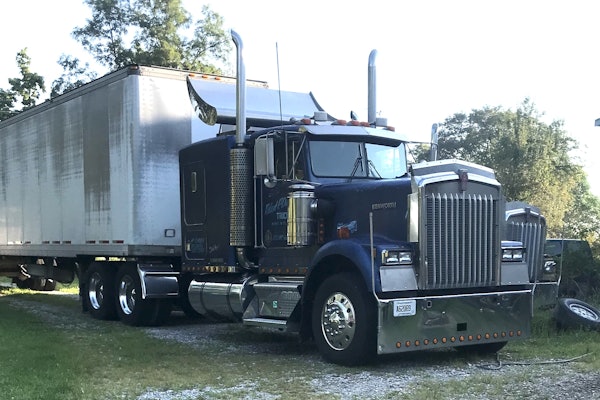With the Federal Motor Carrier Safety Administration's recent interim regulatory guidance on dispatch service providers in trucking, some trucking industry stakeholders are calling on the agency to adequately enforce and/or fully implement the existing laws and regulations to crack down on fraud and abuse.
After the FMCSA's interim guidance reinforced existing official definitions of broker and bona fide agent and reached for clarity around the unofficial third-party category of dispatch services, the broker group Transportation Intermediaries Association hailed parts of the guidance. "TIA’s members continue to see a rise in the amount of unlawful brokerage activities and an increase of dispatch services that illegally broker freight by handling 'traffic allocation' for multiple motor carriers without the proper registration and regulatory requirements," the group said in a statement. Handling "traffic allocation" could take the form of an independent dispatcher acting like a broker and shopping out loads to multiple motor carriers via online load posts, for instance. In its guidance, the FMCSA listed the following factors as No. 4 and 6 in its list of those indicating a dispatch service should in fact have brokerage authority:
- The dispatch service accepts a shipment without a truck/carrier, then attempts to find a truck/carrier to move the shipment.
- The dispatch service is soliciting to the open market of carriers for the purposes of transporting a freight shipment.

Find all the factors via the guidance here. Fundamentally, a dispatch service, with each load it may assist on, should be working for a specific motor carrier -- if not, the service is effectively a broker, in most cases a double broker, and possibly in violation of multiple rules and regs. TIA applauded FMCSA for an attempt to clarify dispatch services' roles, yet the need for enforcement reared its head, no doubt. "This is a positive first step," said TIA President and CEO Anne Reinke, yet "it should not be the final step. The number of unlawful brokerage activities continues to rise."
Reinke called out dispatch services acting effectively as brokers, but any owner-operator in the spot market or who's paid attention to Overdrive the last few years well knows that's not all there is to it, particularly when it comes to actually registered entities (active, authorized carriers and brokers alike) engaged in double-broker schemes, to say nothing of rampant identity theft.
[Related: Fight double-broker fraud: Prevention, ways to elevate enforcement]
The Owner-Operator Independent Drivers Association's comments prior to the recent guidance, too, urged more robust enforcement of existing rules. "For years, small-business truckers have expressed frustration that regulations designed to establish fairness and transparency between motor carriers and brokers have been routinely evaded by brokers or simply not enforced" by the FMCSA, OOIDA President Todd Spencer said, invoking in part the brokered-transaction-transparency rules in place. With FMCSA asking about broker and bona fide agent definitions in the regulations as well as dispatch services, Spencer continued, "many of the underlying issues could be solved through better compliance and enforcement of current regulations as well as finally implementing legislative provisions enacted years ago to prohibit dishonest brokers from conducting business within the trucking industry."
The referenced legislative provisions are required actions the agency has dragged its feet on since Congress passed MAP-21 a decade ago now. They pertain to procedures to suspend brokers' authority immediately after notification that their bonds have been drawn down following claims. The agency published a request for comment back in 2018 on that and other subjects related to surety providers, broker authority and more. The current near-term regs calendar says truckers can expect a January 2023 Notice of Proposed Rulemaking on the subject. Agency officials won't elaborate on what form that proposal will take beyond what's known about the advance notice from 2018.
Provided immediate-suspension provisions and procedures are included in the expected rulemaking, it's likely to at least put a big dent in the profusion of "hit it and move on" scams like this one Overdrive reported on in 2020. Those scams were perhaps beat back to some extent by industry self-help via stopgap measures put in place in 2018 in FMCSA's Licensing and Insurance public portal pending rulemaking.
But immediate suspensions will axe neither recent schemes in which misrepresentation and illegal double brokering abound, all parties get paid and a volume game seems to be the goal, nor double-brokering by well-known, large carriers with broker authority.
"We certainly have seen a recent surge in double brokering in reports from our membership," said OOIDA spokesperson Norita Taylor, "and are exploring potential solutions with the agency and other stakeholders." OOIDA's also hopeful for meaningful action around the association's 2020 petition around brokered-transaction transparency.
In the view of transportation attorney Hank Seaton, the recent guidance around dispatch services, brokers and agents does little to provide clarity, muddying up the legal waters around dispatch services in particular.
FMCSA's guidance lays out a sort of "case by case basis" for determining if a dispatch service should have brokerage authority or not, he said. Private actions against dispatch services operating as brokers and skirting regulatory requirements would thus seem to require a cumbersome investigation into whether the dispatcher meets or doesn't meet the many factors within the new guidance before "you could even bring a lawsuit" in the event of a dispute over payment. The agency itself seems to have "no appetite to do anything" when it comes to meaningful enforcement of what's already on the books, Seaton continued.
He felt FMCSA in some ways had merely "picked and chose what it responds to," ignoring the "the elephant in the room. Its own database shows that hundreds of complaints about broker abuse go unaddressed."
FMCSA's latest interim guidance didn't address core points "about systemic fraud and the lack of enforcement" that Seaton's own coalition of groups -- representing shippers, brokers and carriers alike -- made to this year's earlier request for comment on broker/agent/dispatch service definitions. Among associations and businesses signed on to the commentary were the National Association of Small Trucking Companies, Expedite Association of America, Auto Halers Association of America, Apex Capital and several others.
"There is no effective cop on the block protecting shippers, brokers and carriers against unauthorized operations, frauds, scams, and identity thefts involving the abuses of intermediaries in regulated truck transportation," the commentary's conclusion read in part. "The analysis of applicable regulations and statutes ... demonstrates the FMCSA and DOT have the unique authority to enforce uniform rules of commerce, police the industry, and prosecute fraud involving intermediaries."
Providing significant examples where fraudulent brokering resulted in theft of funds and freight itself, Seaton's commentary on behalf of the associations concluded that DOT and/or the FMCSA "should establish and staff a permanent task force to monitor complaints about fraudulent and intentional breaches of regulations by regulated brokers and carriers and establish a proactive prosecutorial staff to discharge its statutory and regulatory duties to enforce existing rules of commerce including civil and criminal penalties available to the Department of Transportation."
Following the latest interim guidance, Seaton said he felt that the time had come to "look beyond FMCSA as an agency with the resources or interest in the issue of intermediary abuse."
He garners some hope from recent prosecutions emanating from the DOT's Office of Inspector General, at least. "A major legislative agenda for the new Congress and petition for the DOT to consider," he said, "is the need for a special task force within the OIG at the Departmental level, to police and enforce the rules against supply chain fraud, double brokerage and larceny by fraud."
Comments on FMCSA's interim guidance around brokers, agents and dispatch services are due January 17, 2023. As of this report, just four had been posted over two weeks since the guidance's release.
[Related: FMCSA/DOT finally getting serious about double brokering?]










